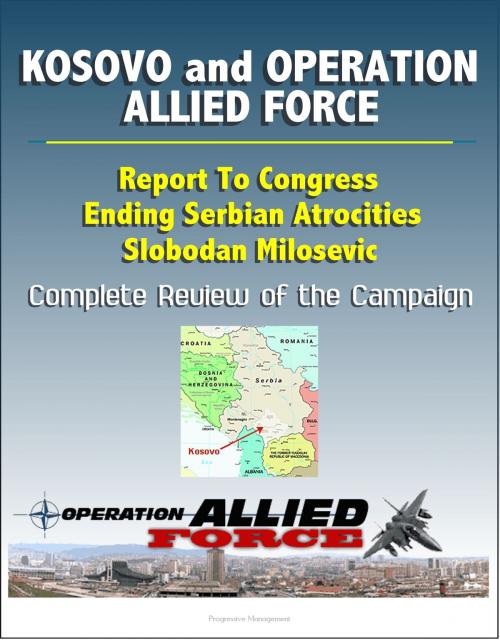Kosovo and Operation Allied Force After-Action Report: Report To Congress, Ending Serbian Atrocities, Slobodan Milosevic, Complete Review of the Campaign
Nonfiction, History, Military, Aviation, United States| Author: | Progressive Management | ISBN: | 9781301721139 |
| Publisher: | Progressive Management | Publication: | September 4, 2013 |
| Imprint: | Smashwords Edition | Language: | English |
| Author: | Progressive Management |
| ISBN: | 9781301721139 |
| Publisher: | Progressive Management |
| Publication: | September 4, 2013 |
| Imprint: | Smashwords Edition |
| Language: | English |
For 78 days, from March to June 1999, the United States and its NATO allies engaged in a major military operation to bring an end to Serbian atrocities in Kosovo. At a turning point in NATO's long and successful history, Operation Allied Force was an overwhelming success. This report, which is forwarded in response to Congressional requirements, provides considerable detail on both the diplomatic background to the Kosovo conflict and to the military and humanitarian relief operations that followed. The United States military forces that took part in this challenging effort performed superbly. The men and women of our armed forces excelled in undertaking a military operation that delivered a decisive response to Serbian aggression and was characterized by extraordinary professionalism, innovation, and bravery.
We forced Slobodan Milosevic to withdraw his forces from Kosovo, degraded his ability to wage military operations, and rescued over one million refugees. We accomplished these goals through a cohesive alliance of democratic nations whose military men and women conducted the most effective air operation in history. From the onset of the operation, the United States and its NATO allies had three primary interests: Ensuring the stability of Eastern Europe. Serb aggression in Kosovo directly threatened peace throughout the Balkans and thereby the stability of all of southeastern Europe. There was no natural boundary to this violence, which already had moved through Slovenia and Croatia to Bosnia.
Thwarting ethnic cleansing. The Belgrade regime's cruel repression in Kosovo, driving thousands from their homes, created a humanitarian crisis of staggering proportions. Milosevic's campaign, which he dubbed "Operation Horseshoe", would have led to even more homelessness, starvation, and loss of life had his ruthlessness gone unchecked. Ensuring NATO's credibility. The Federal Republic of Yugoslavia and the Republic of Serbia signed agreements in October 1998 that were to be verified by the Organization for Security and Cooperation in Europe and monitored by NATO. In the period leading up to March 1999, Serbian forces increasingly and flagrantly violated these agreements. Had NATO not responded to Milosevic's defiance and his campaign of ethnic cleansing, its credibility would have been called into question.
The Kosovo conflict confirmed one of NATO's enduring strengths: the independence of each of NATO's member nations defines the institution. The fact that these separate nations sometimes disagreed in the course of the campaign (on some of the tactics, but never on the core aims) is proof of the fundamental democratic spirit that animates NATO, and that spirit will keep the Alliance strong in facing any future challenge to the peace, stability, and freedom of the North Atlantic region.
Operational Perspective * Purpose of the Report * Organization of the Report * EXECUTIVE SUMMARY * Lessons Learned * Men and Women in Service * NATO Contributions * Improving Allied Military Capabilities * Target-Approval Process * Bombing of the Chinese Embassy in Belgrade * Relationship with Russia * Effect on Our Capability To Fight Two Major Theater Wars * Ground Operation * Absence of Combat Fatalities * Command, Control, Communications, and Computers * Intelligence, Surveillance, and Reconnaissance * Preferred Munitions * Air Defense Suppression * Logistics and Deployment * I. GEOPOLITICAL CONSIDERATIONS * A. Prelude to Conflict * 1. Background on the Conflict * 2. Interests at Stake * 3. Reaffirming the Alliance * B. The Campaign Over Kosovo * 1. An Asymmetric Conflict * 2. U.S. and NATO Strategic Objectives * 3. Phases of the Campaign * 4. Status of a Ground Forces Plan * 5. Conditions To End the Operation * 6. Role of Diplomacy * 7. Mandate and Legal Basis * C. Why Did Milosevic Capitulate? * D. Implications for U.S. Defense Strategy
For 78 days, from March to June 1999, the United States and its NATO allies engaged in a major military operation to bring an end to Serbian atrocities in Kosovo. At a turning point in NATO's long and successful history, Operation Allied Force was an overwhelming success. This report, which is forwarded in response to Congressional requirements, provides considerable detail on both the diplomatic background to the Kosovo conflict and to the military and humanitarian relief operations that followed. The United States military forces that took part in this challenging effort performed superbly. The men and women of our armed forces excelled in undertaking a military operation that delivered a decisive response to Serbian aggression and was characterized by extraordinary professionalism, innovation, and bravery.
We forced Slobodan Milosevic to withdraw his forces from Kosovo, degraded his ability to wage military operations, and rescued over one million refugees. We accomplished these goals through a cohesive alliance of democratic nations whose military men and women conducted the most effective air operation in history. From the onset of the operation, the United States and its NATO allies had three primary interests: Ensuring the stability of Eastern Europe. Serb aggression in Kosovo directly threatened peace throughout the Balkans and thereby the stability of all of southeastern Europe. There was no natural boundary to this violence, which already had moved through Slovenia and Croatia to Bosnia.
Thwarting ethnic cleansing. The Belgrade regime's cruel repression in Kosovo, driving thousands from their homes, created a humanitarian crisis of staggering proportions. Milosevic's campaign, which he dubbed "Operation Horseshoe", would have led to even more homelessness, starvation, and loss of life had his ruthlessness gone unchecked. Ensuring NATO's credibility. The Federal Republic of Yugoslavia and the Republic of Serbia signed agreements in October 1998 that were to be verified by the Organization for Security and Cooperation in Europe and monitored by NATO. In the period leading up to March 1999, Serbian forces increasingly and flagrantly violated these agreements. Had NATO not responded to Milosevic's defiance and his campaign of ethnic cleansing, its credibility would have been called into question.
The Kosovo conflict confirmed one of NATO's enduring strengths: the independence of each of NATO's member nations defines the institution. The fact that these separate nations sometimes disagreed in the course of the campaign (on some of the tactics, but never on the core aims) is proof of the fundamental democratic spirit that animates NATO, and that spirit will keep the Alliance strong in facing any future challenge to the peace, stability, and freedom of the North Atlantic region.
Operational Perspective * Purpose of the Report * Organization of the Report * EXECUTIVE SUMMARY * Lessons Learned * Men and Women in Service * NATO Contributions * Improving Allied Military Capabilities * Target-Approval Process * Bombing of the Chinese Embassy in Belgrade * Relationship with Russia * Effect on Our Capability To Fight Two Major Theater Wars * Ground Operation * Absence of Combat Fatalities * Command, Control, Communications, and Computers * Intelligence, Surveillance, and Reconnaissance * Preferred Munitions * Air Defense Suppression * Logistics and Deployment * I. GEOPOLITICAL CONSIDERATIONS * A. Prelude to Conflict * 1. Background on the Conflict * 2. Interests at Stake * 3. Reaffirming the Alliance * B. The Campaign Over Kosovo * 1. An Asymmetric Conflict * 2. U.S. and NATO Strategic Objectives * 3. Phases of the Campaign * 4. Status of a Ground Forces Plan * 5. Conditions To End the Operation * 6. Role of Diplomacy * 7. Mandate and Legal Basis * C. Why Did Milosevic Capitulate? * D. Implications for U.S. Defense Strategy















